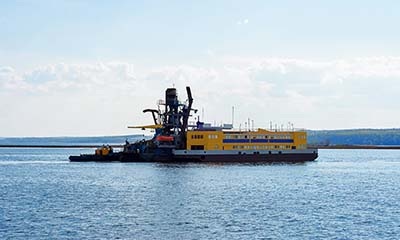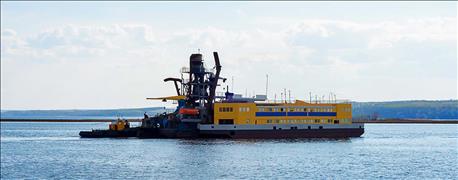
by Pablo Gonzalez
Argentina is bringing in a super-sized dredger to help clear its river channels after heavy rainfall brought sediment that threatens grain exports.
The Niccolo Machiavelli, named for the 15th century Italian diplomat who once wrote it was “safer to be feared than loved,” is scheduled to start operations in the country next week. It will be the biggest ever vessel of its kind to come to South America and could be the answer for grain exports at risk of delays after April rains flooded fields and deposited sediment in one of the nation’s main waterways.

Argentina is bringing in a super-sized dredger to help clear its river channels after heavy rainfall brought sediment that threatens grain exports.
Longer than a football field, the vessel will be used to clear the Emilio Mitre Channel in the River Plate estuary, the main route used by exporters such as Cargill Inc. and Bunge Ltd. Given its size, it will block navigation of export vessels for about five hours a day for at least three months. The dredger is being brought in by Hidrovias SA, according to two board members who asked not to be named, citing company policy.
Hidrovias, a joint venture between Belgium’s Jan de Nul-Dredging NV and Argentina’s Emepa SA, is the company responsible for ensuring that vessels with a draft of as much as 34 feet can use the river, navigate and get to to Rosario ports, the origin of 80% of Argentina’s grain and oilseed exports. Jan de Nul-owned Machiavelli is being deployed after a critical situation two months ago when an unusual amount of sediment started blocking the Emilio Mitre channel and two additional dredgers were brought in to clear the way, one of the board members said.
El Nino
Bringing Machiavelli from the Dominican Republic, along with the two other additional dredgers, will cost Hidrovias $60 million, or 30% of its annual toll income of $200 million, said one of the board members.
The El Nino weather phenomenon is to blame for the sediments covering the Mitre channel after floods. Now that El Nino is shifting to a La Nina pattern, a severe tidal ebb is expected to form, creating even more problems. The ebb is expected to be as dramatic as a record event in 1983, which shut the Mitre channel for months, a Hidrovias board member said. Argentina is among the world’s biggest shippers of the oilseed and the No. 1 exporter of soybean meal.
Bottlenecks expected
“Everybody should be worried,” Juan Borus, an engineer at the Argentine Water Institute institute, said by telephone from Ezeiza, Buenos Aires province. It “will be a serious headache for Hidrovias, which won’t be able to easily ensure 34 feet of depth navigation at a time when the crop is being shipped,” Borus said
Machiavelli is coming to help clear the water in advance of the ebb. Still, the move to bring in such a huge dredger is not without its complications. Bottlenecks are expected to form, and traffic will be chaotic, said an official for the coast guard, the authority that will be in charge of controlling the route, asking not to be named because he isn’t authorized to speak to the press.
Andres Alcaraz, a spokesman for the exporters group Ciara-Cec, had no immediate comment when reached by telephone. The coast guard declined to comment when a spokesman was reached by phone.
There’s also concern that with all of Hidrovias’ dredgers in operations at least 270 kilometers (168 miles) south of the Rosario port, it will have less ability to assist if a vessel becomes grounded up river, a port official said asking not to be named because he’s not authorized to speak to the press. For every day of delay, exporters have to pay an additional $20,000 in vessel costs, the official said.
"The delays will indeed add extra cost to exporters," said Alfredo Sese, a transport analyst at the Rosario Exchange, the nation’s largest grain bourse.
Argentine shipping also faces delays at some ports north of Rosario due to labor protests, Guillermo Wade of the Rosario port authority said Friday.
A record 1.6 million hectares of soybean plantings in Argentina were lost because of recent heavy rains, the Buenos Aires Grain Exchange said May 6.
To contact the reporter on this story:
Pablo Gonzalez in Buenos Aires at [email protected]
To contact the editors responsible for this story:
Simon Casey at [email protected]
Millie Munshi
© 2016 Bloomberg L.P
About the Author(s)
You May Also Like




